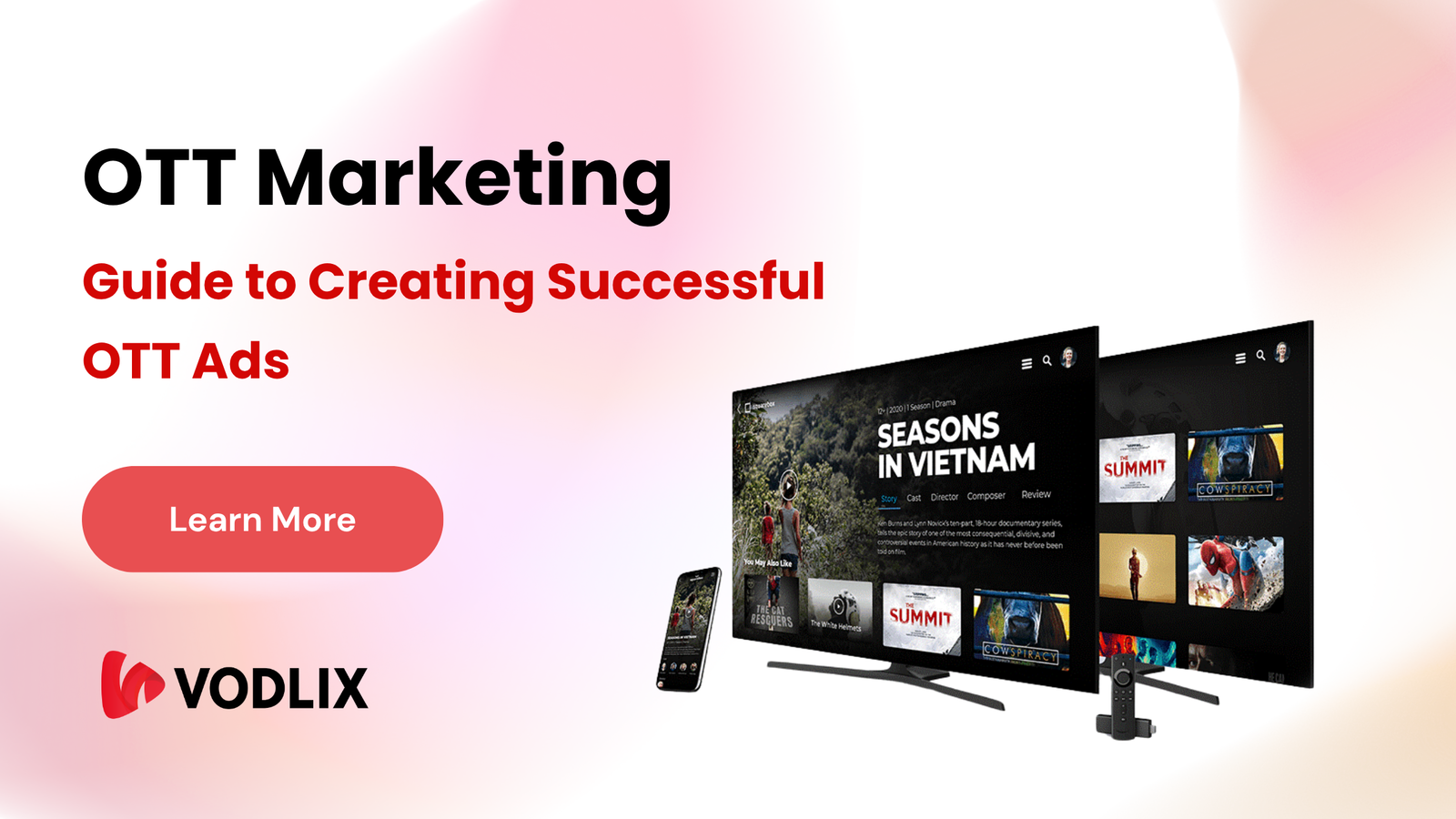أدى الارتفاع السريع لخدمات البث المباشر إلى إعادة تشكيل الطريقة التي يستهلك بها الجمهور المحتوى بشكل كامل. فمع انتقال المشاهدين من قنوات البث التقليدية إلى المنصات الرقمية، تعمل العلامات التجارية على تعديل استراتيجياتها التسويقية بسرعة. إحدى أقوى الفرص في هذا العصر الجديد هي التسويق عبر الإنترنت - نهج ديناميكي قائم على البيانات للوصول إلى الجماهير مباشرةً من خلال الأجهزة المتصلة بالإنترنت.
سوف يرشدك هذا الدليل الشامل إلى المبادئ الأساسية والاستراتيجيات القابلة للتنفيذ والتكتيكات المتقدمة لإنشاء إعلانات OTT الناجحة التي تحقق نتائج حقيقية.
ما هو التسويق عبر الإنترنت؟
التسويق عبر الإنترنت (OTT (Over-The-Te-Top)) يشير إلى الإعلانات التي يتم تقديمها عبر خدمات البث المباشر والأجهزة المتصلة بالإنترنت، متجاوزًا التوزيع التقليدي عبر الكابل والأقمار الصناعية. وخلافًا للإعلانات التلفزيونية الخطية، تستفيد إعلانات OTT من البيانات والتفاعل والتخصيص لتقديم محتوى وثيق الصلة بجماهير مقسمة.
تشمل منصات OTT الشهيرة ما يلي:
نتفليكس
هولو
ديزني+
أمازون برايم فيديو
روكو
يوتيوب تي في
تلفزيون بلوتو
توبي
يصل المشاهدون إلى هذه المنصات على أجهزة التلفاز الذكية والهواتف الذكية والأجهزة اللوحية وأجهزة الألعاب وأجهزة الكمبيوتر المكتبية - مما يمنح المسوقين نقاط اتصال متعددة لإشراك الجمهور في أي وقت وفي أي مكان.
لماذا تتحول العلامات التجارية نحو التسويق عبر الإنترنت
إن التحول إلى بث المحتوى عبر الإنترنت ليس اتجاهاً جديداً، بل هو مستقبل إعلانات الفيديو. إليك سبب تزايد استثمار العلامات التجارية في إعلانات OTT:
تغيّر سلوك الجمهور: يتزايد عدد المشتركين الذين قاموا بقطع الاشتراكات الكبلية التقليدية، حيث ألغى الملايين اشتراكات الكابل التقليدية.
قدرات استهداف أفضل: تقوم منصات بث المحتوى عبر الإنترنت بجمع بيانات المستخدمين على نطاق واسع، مما يسمح باستهداف الجمهور بدقة بناءً على التركيبة السكانية والاهتمامات والسلوكيات.
معدلات مشاركة أعلى: غالبًا ما تحقق إعلانات OTT معدلات إكمال أعلى مقارنة بالإعلانات التلفزيونية التقليدية.
الوصول عبر الأجهزة: يمكن للعلامات التجارية عرض الإعلانات عبر أجهزة متعددة، والوصول إلى المستهلكين أينما كانوا.
المكونات الأساسية لاستراتيجية تسويق عبر الإنترنت عالية الأداء
1. تحديد سمات الجمهور وتقسيمه
يبدأ النجاح بفهم من تستهدفه. يوفر التسويق عبر الإنترنت تقسيم الجمهور بشكل دقيق:
التركيبة السكانية: العمر والجنس ومستوى الدخل والتعليم
الجغرافيا: الاستهداف المستند إلى الموقع الجغرافي من أجل الملاءمة الإقليمية
السلوكيات: عادات المشاهدة وتفضيلات الجهاز والمشتريات السابقة
الاهتمامات وأسلوب الحياة: الهوايات والاهتمامات وميول العلامة التجارية
كلما كان الملف التعريفي لجمهورك أكثر تفصيلاً، كلما كانت رسائلك أكثر تخصيصاً، مما يؤدي إلى زيادة معدلات المشاركة والتحويل.
2. وضع أهداف واضحة للحملة
يجب أن يكون لكل حملة تسويقية عبر بث المحتوى عبر الإنترنت أهداف محددة جيدًا. وتشمل أهداف التسويق عبر الإنترنت الشائعة ما يلي:
يتيح لك وجود أهداف قابلة للقياس تحسين المواد الإبداعية الإعلانية ومعايير الاستهداف والميزانيات وفقًا لذلك.
3. صياغة محتوى إبداعي مقنع
لا يزال المحتوى هو الملك، ولكن في التسويق عبر الإنترنت (OTT)، فإن جذب الانتباه بسرعة أمر بالغ الأهمية.
خطاف قوي
الرسائل الموجزة: توصيل الرسالة الرئيسية بسرعة - غالبًا ما يكون أداء الإعلانات التي تتراوح مدتها بين 15 و30 ثانية هو الأفضل.
قيمة إنتاج عالية: المرئيات والصوت عالي الجودة يعكسان مصداقية العلامة التجارية.
التخصيص: تنويعات المحتوى المصممة خصيصًا لمختلف شرائح الجمهور.
4. التحسين متعدد المنصات
يستهلك جمهور OTT المحتوى على أجهزة التلفزيون الذكية والأجهزة المحمولة وأجهزة الكمبيوتر المكتبية وأجهزة الألعاب. يجب أن تكون إعلاناتك:
5. التخصيص الذكي للميزانية
يمكن أن تكون حملات OTT فعالة لكل من الشركات الصغيرة والشركات الكبيرة. عند وضع الميزانية:
وازن بين الوصول المتوازن مع الحد الأقصى للتكرار لتجنب إرهاق الإعلانات.
اختبر العديد من التصميمات والتنسيقات.
استثمر في المنصات الأكثر توافقاً مع جمهورك المستهدف.
تحسين الإنفاق بناءً على بيانات الأداء في الوقت الفعلي.
تنسيقات إعلانات OTT الرئيسية
1. إعلانات الفيديو في البث المباشر
يتم تقديمها قبل أو أثناء أو بعد بث المحتوى. وهي تحاكي الإعلانات التلفزيونية التقليدية ولكنها تقدم استهدافاً متقدماً.
2. إعلانات الفيديو التفاعلية
شجع المشاهدين على التفاعل مباشرةً من خلال النقر أو التمرير أو اتخاذ إجراء داخل الإعلان.
3. المحتوى المدعوم الأصلي
تدمج العلامات التجارية المنتجات أو الخدمات بشكل طبيعي في برمجة OTT، مما يؤدي إلى عرض سلس للعلامة التجارية.
4. إعلانات التراكب والإيقاف المؤقت
الإعلانات الثابتة أو المتحركة التي يتم عرضها أثناء فترات توقف المحتوى مؤقتًا، مما يوفر رسائل غير متطفلة ولكنها مرئية.
5. السرد القصصي المتسلسل
قدِّم إصدارات إعلانية متعددة في سلسلة من الإعلانات لبناء قصص أو رعاية العملاء المحتملين أو توجيه المشاهدين خلال رحلة المشتري.
مقاييس التسويق عبر الإنترنت لتتبعها
توفر إعلانات OTT رؤى غنية وقابلة للتنفيذ. تشمل مقاييس الأداء الرئيسية ما يلي:
الانطباعات: إجمالي مرات عرض الإعلان.
معدل الإنجاز: النسبة المئوية للمشاهدين الذين شاهدوا الإعلان كاملاً.
معدل النقر إلى الظهور (CTR): عدد النقرات لكل عرض إعلان.
معدل المشاركة: التفاعل مع العناصر التفاعلية.
معدل التحويل: الإجراءات المكتملة بعد عرض الإعلان.
التردد: متوسط عدد المرات التي شاهد فيها الفرد الإعلان.
التكلفة لكل مشاهدة مكتملة (CPCV): كفاءة التكلفة لكل إعلان تم عرضه بالكامل
تحديات التسويق عبر الإنترنت (وكيفية التغلب عليها)
1. تجزئة المنصة
يتشتت الجمهور عبر خدمات OTT المختلفة. الحل: تنويع مواضع الإعلانات عبر منصات متعددة لضمان وصول واسع النطاق.
2. الإرهاق الإعلاني
يمكن أن يؤدي التكرار المفرط إلى تهيج المشاهدين. الحل: تطبيق حدود قصوى للتكرار وتدوير المواد الإبداعية بانتظام.
3. لوائح الخصوصية
جمع البيانات يأتي مع المسؤولية. الحل: ضمان الامتثال للائحة العامة لحماية البيانات، وقانون حماية خصوصية البيانات وقوانين الخصوصية الأخرى.
4. التكيف الإبداعي
تتطلب التنسيقات المتعددة مرونة إبداعية. الحل: خطط لسير عمل الإنتاج الإبداعي القابل للتطوير لاستيعاب المواصفات المختلفة.
استراتيجيات مثبتة لتحقيق أقصى قدر من النجاح في التسويق عبر الإنترنت
1. الاستفادة من الشراء البرمجي
تعمل منصات OTT البرمجية على أتمتة مواضع الإعلانات في الوقت الفعلي، مما يسمح:
المزايدة الفعالة
دقة استهداف محسّنة
الإنفاق الأمثل
2. الاستفادة من الإدراج الديناميكي للإعلانات (DAI)
تتيح لك تقنية DAI عرض إعلانات مخصصة استناداً إلى بيانات المشاهد في الوقت الفعلي، مما يزيد من الملاءمة والعائد على الاستثمار.
3. إعادة الاستهداف عبر الأجهزة
استخدم إعادة الاستهداف عبر المنصات لإعادة إشراك المستخدمين عبر الأجهزة، مما يعزز رسالتك طوال رحلة العميل.
4. الجمع بين OTT والحملات الرقمية الأوسع نطاقًا
دمج OTT مع:
يؤدي هذا النهج المتكامل إلى زيادة التحويلات ورفع مستوى العلامة التجارية.
5. اختبار A/B لتصميماتك الإبداعية
اختبر الاختلافات في الرسائل والعناصر المرئية والدعوات لاتخاذ إجراء والأطوال لتحديد المجموعات الإبداعية الأفضل أداءً.
الاتجاهات التي تشكل مستقبل التسويق عبر الإنترنت
إعلانات OTT القابلة للتسوق عبر الإنترنت
تُعيد الإعلانات التفاعلية التي تتيح للمشاهدين شراء المنتجات مباشرةً من خلال شاشاتهم تعريف التجارة الإلكترونية.
التخصيص القائم على الذكاء الاصطناعي
يحلل الذكاء الاصطناعي البيانات في الوقت الفعلي لعرض إعلانات شديدة الاستهداف، مما يحسن معدلات المشاركة.
الإعلانات التي يتم تنشيطها صوتياً
مع أجهزة التلفاز والأجهزة الذكية، توفر الإعلانات التي تدعم الصوت طبقات تفاعل جديدة.
نماذج الإسناد عبر المنصات
تساعد نماذج القياس الجديدة العلامات التجارية على فهم أفضل لتأثير OTT على رحلات العملاء الكاملة.
كيف تعمل Vodlix على تمكين نجاح التسويق عبر الإنترنت عبر الإنترنت
في Vodlix، نحن في Vodlix نتفهم المشهد المتطور لخدمات بث المحتوى عبر الإنترنت ونقدم حلولاً متكاملة مصممة لمالكي المحتوى والمسوقين على حد سواء:
إدراج الإعلانات الديناميكية لعرض إعلانات مخصصة في الوقت الفعلي
التحويل النقدي المتكامل لنماذج الإيرادات السمعية والبصرية حسب الطلب، والفيديو حسب الطلب، والتلفزيون حسب الطلب، ونماذج الإيرادات المختلطة
تكامل سلس مع خادم إعلانات الجهة الخارجية
التحليلات والتقارير المتقدمة لقياس سلوك الجمهور وأداء الإعلانات
توافق كامل عبر الأجهزة للجوال والتلفزيون الذكي ووحدة التحكم في الألعاب والتوزيع عبر الإنترنت
بنية تحتية سحابية قابلة للتطوير للتعامل مع متطلبات الجمهور العالمي المتزايدة
مع Vodlix، يمكن للعلامات التجارية بثقة تنفيذ استراتيجيات تسويق متقدمة عبر الإنترنت لا تصل إلى الجمهور المناسب فحسب، بل تحقق نتائج قابلة للقياس أيضًا.
الخاتمة
لقد برز التسويق عبر بث المحتوى عبر الإنترنت كواحدة من أكثر القنوات الإعلانية فعالية وقائمة على البيانات في المشهد الإعلامي المجزأ اليوم. مع انتقال المزيد من المستهلكين إلى منصات البث، تكتسب العلامات التجارية التي تتكيف مع التسويق عبر بث المحتوى عبر الإنترنت في وقت مبكر ميزة كبيرة في الوصول إلى الجمهور والمشاركة والعائد على الاستثمار.
بفضل إمكانات الاستهداف القوية وتنسيقات الإعلانات المرنة وبيانات الأداء القابلة للقياس، تُمكِّن إعلانات OTT المسوقين من إنشاء حملات مخصصة وفعالة للغاية. منصات مثل فودليكس جعل إنشاء خدمة OTT وتحقيق الدخل منها وتوسيع نطاقها أسهل من أي وقت مضى مع زيادة إمكاناتك التسويقية إلى أقصى حد.






